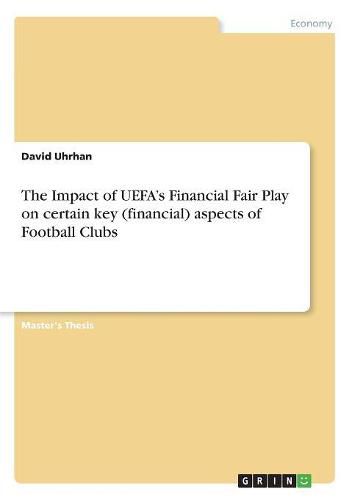Readings Newsletter
Become a Readings Member to make your shopping experience even easier.
Sign in or sign up for free!
You’re not far away from qualifying for FREE standard shipping within Australia
You’ve qualified for FREE standard shipping within Australia
The cart is loading…






Master’s Thesis from the year 2017 in the subject Business economics - Business Management, Corporate Governance, grade: 1,7, Frankfurt School of Finance & Management, language: English, abstract: This thesis sheds light on why UEFA came up with regulations in this form and what possible alternative forms the regulation framework could have taken. Additionally, the analysis shows how the relevant elements for the BE-calculation have evolved since the announcement of FFP and whether significant changes are perceptible. On top of this, the author will further investigate just how effective UEFA’s monitoring and sanctioning procedure are for clubs when breaches of FFP regulations occur and whether any improvements in the relevant measures indicators have taken place. This work shows that FFP has not been able to limit transfer spending or salary inflation in European club football. Moreover, it illustrates how the clubs’ financial situations have improved in recent years. Growing equity through owner’s capital contributions, new money through foreign takeovers as well as rising operating profits, enabled clubs to reduce their debt level and improve their BE-results. With revenue growth exceeding the growth of salary and operating costs, clubs have been able to reduce their losses and more and more clubs report bottom-line profits. Analyzing the different sources of revenue that clubs are obtaining and the relevance of each source over time, it is perceivable that especially the Money League (ML) clubs have been able to increase their income through commercial activities while smaller clubs benefit through collectively bargained broadcasting agreements. By enforcing FFP, UEFA has already excluded a few clubs from European club competitions, imposed monetary fines and squad size restrictions and entered into several settlement agreements with clubs not fulfilling the BE-criterion. However, UEFA lacks transparency about the monitoring process as they do not publish any i
$9.00 standard shipping within Australia
FREE standard shipping within Australia for orders over $100.00
Express & International shipping calculated at checkout
Master’s Thesis from the year 2017 in the subject Business economics - Business Management, Corporate Governance, grade: 1,7, Frankfurt School of Finance & Management, language: English, abstract: This thesis sheds light on why UEFA came up with regulations in this form and what possible alternative forms the regulation framework could have taken. Additionally, the analysis shows how the relevant elements for the BE-calculation have evolved since the announcement of FFP and whether significant changes are perceptible. On top of this, the author will further investigate just how effective UEFA’s monitoring and sanctioning procedure are for clubs when breaches of FFP regulations occur and whether any improvements in the relevant measures indicators have taken place. This work shows that FFP has not been able to limit transfer spending or salary inflation in European club football. Moreover, it illustrates how the clubs’ financial situations have improved in recent years. Growing equity through owner’s capital contributions, new money through foreign takeovers as well as rising operating profits, enabled clubs to reduce their debt level and improve their BE-results. With revenue growth exceeding the growth of salary and operating costs, clubs have been able to reduce their losses and more and more clubs report bottom-line profits. Analyzing the different sources of revenue that clubs are obtaining and the relevance of each source over time, it is perceivable that especially the Money League (ML) clubs have been able to increase their income through commercial activities while smaller clubs benefit through collectively bargained broadcasting agreements. By enforcing FFP, UEFA has already excluded a few clubs from European club competitions, imposed monetary fines and squad size restrictions and entered into several settlement agreements with clubs not fulfilling the BE-criterion. However, UEFA lacks transparency about the monitoring process as they do not publish any i